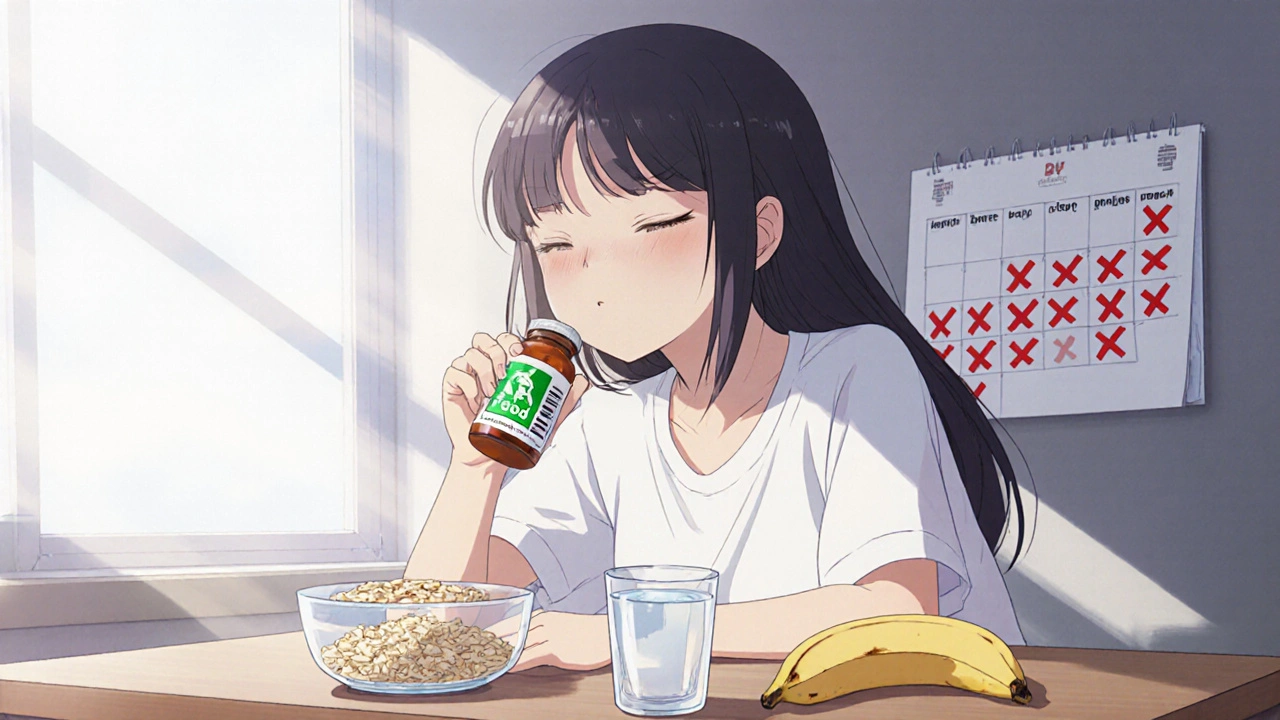
Health October 28, 2025
Taking Medication with Food: When and Why It Reduces Side Effects
Medication-Food Interaction Checker
Many people swallow pills with a glass of water and call it a day. But what if that glass of water should’ve been a bowl of oatmeal? Or what if taking your pill on an empty stomach could be making you sick? The truth is, food isn’t just something you eat-it’s a powerful player in how your body handles medication. For a lot of drugs, taking them with or without food isn’t a suggestion. It’s a safety rule.
Why Food Changes How Medicines Work
When you eat, your body goes into digestion mode. Stomach acid increases. Your gut slows down. Blood flow shifts. All of this affects how drugs get absorbed. Some medications need that extra stomach acid to dissolve properly. Others get blocked by calcium in milk or overwhelmed by fat in a burger. The difference between taking a pill with food or without can mean the difference between it working-or causing nausea, dizziness, or worse.
Take non-steroidal anti-inflammatory drugs (NSAIDs) like ibuprofen. On an empty stomach, they can irritate the stomach lining. Studies show that 38% of people who take them without food develop microscopic bleeding in the gut. That number drops to 12% when taken with food. That’s not just comfort-it’s protection.
Then there’s absorption. For some drugs, food actually helps them get into your bloodstream. Griseofulvin, an antifungal, absorbs 15-30% better with a high-fat meal. Same with certain antidepressants and antipsychotics like clozapine-eating a fatty meal can boost blood levels by 40-60%. That might sound good, but it can also mean more drowsiness, dizziness, or even dangerous drops in blood pressure.
When Food Makes Things Worse
Not all food helps. Some foods actively block medications. Calcium, found in dairy, fortified orange juice, and supplements, binds to antibiotics like tetracycline and ciprofloxacin. This can cut their absorption by up to 50%. If you’re on antibiotics and you have a yogurt with breakfast, you might as well not have taken the pill at all.
Grapefruit juice is another big one. It doesn’t just interfere with one or two drugs-it messes with enzymes in your gut that break down over 85 medications. Cyclosporine, used after organ transplants, can see blood levels jump 300-500% after just one glass. That’s not a stronger effect-it’s a toxic one. The same goes for statins like simvastatin. Grapefruit juice can make its levels spike 9 to 15 times higher than normal, increasing the risk of muscle damage and kidney failure.
Even something as simple as leafy greens can throw off your meds. Warfarin, a blood thinner, works by blocking vitamin K. If you eat spinach or kale one day and skip it the next, your INR levels (which measure blood clotting) can swing wildly. One study found that 41% of warfarin patients had to adjust their dose because of inconsistent vegetable intake.
Medications That Must Be Taken on an Empty Stomach
Some drugs need nothing in your stomach-nothing at all. Levothyroxine, used for hypothyroidism, is one of the most common. Food, especially calcium or iron supplements, can reduce its absorption by 30-55%. That means your thyroid levels stay low, your energy stays down, and your weight might creep up-even if you’re taking the right dose.
Proton pump inhibitors like omeprazole work by shutting down stomach acid. But they need that acid to be present to activate. That’s why they’re taken 30 minutes before meals. Take them with food, and they won’t work as well.
Antibiotics like amoxicillin and azithromycin also perform better on an empty stomach. Food can slow down how fast they enter your system, giving bacteria more time to adapt and resist.
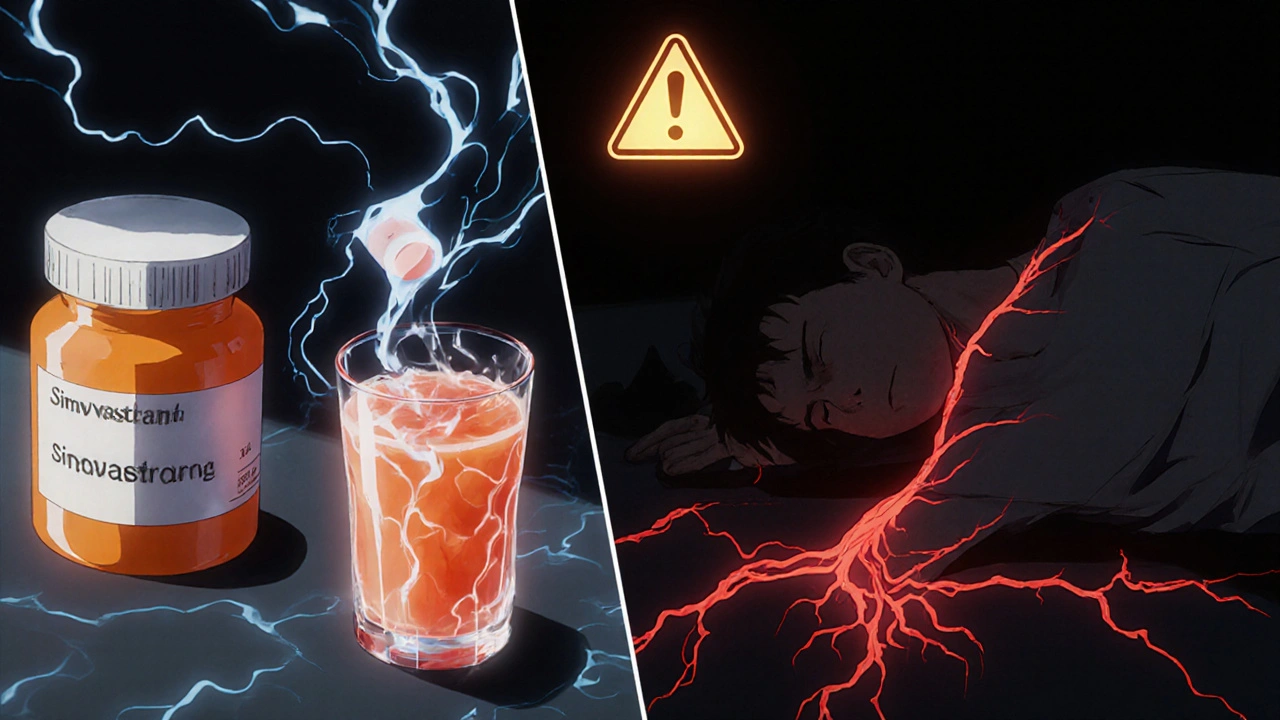
What Does “With Food” Actually Mean?
“Take with food” sounds simple. But what counts as food? A cracker? A banana? A full sandwich?
The FDA says “with food” means at least 250-500 calories. That’s about a bowl of cereal with milk, a sandwich, or a smoothie with protein. A sip of coffee and a biscuit won’t cut it.
“On an empty stomach” means 1 hour before or 2 hours after eating. That’s strict. Even a small snack can interfere. Many people don’t realize this. A Mayo Clinic study found that 57% of people taking levothyroxine occasionally took it with breakfast. That’s why 32% of them ended up needing higher doses just to get the same effect.
Real People, Real Mistakes
It’s not just theory. Real people make these mistakes every day.
On Reddit, over 1,200 people shared stories about methotrexate, a drug used for arthritis and some cancers. Nearly 80% said taking it with food cut their nausea in half. But 22% noticed it didn’t seem to work as well. That’s the trade-off: less side effects, maybe less effectiveness.
Metformin, a diabetes drug, causes stomach upset in 63% of people when taken without food. With food? That drops to 18%. But many patients skip meals to control their blood sugar-and then wonder why they feel sick.
And it’s not just young people. A Cleveland Clinic survey found that 68% of patients over 65 had no idea their meds needed special timing. Only 22% got clear instructions from their doctor. That’s a huge gap.
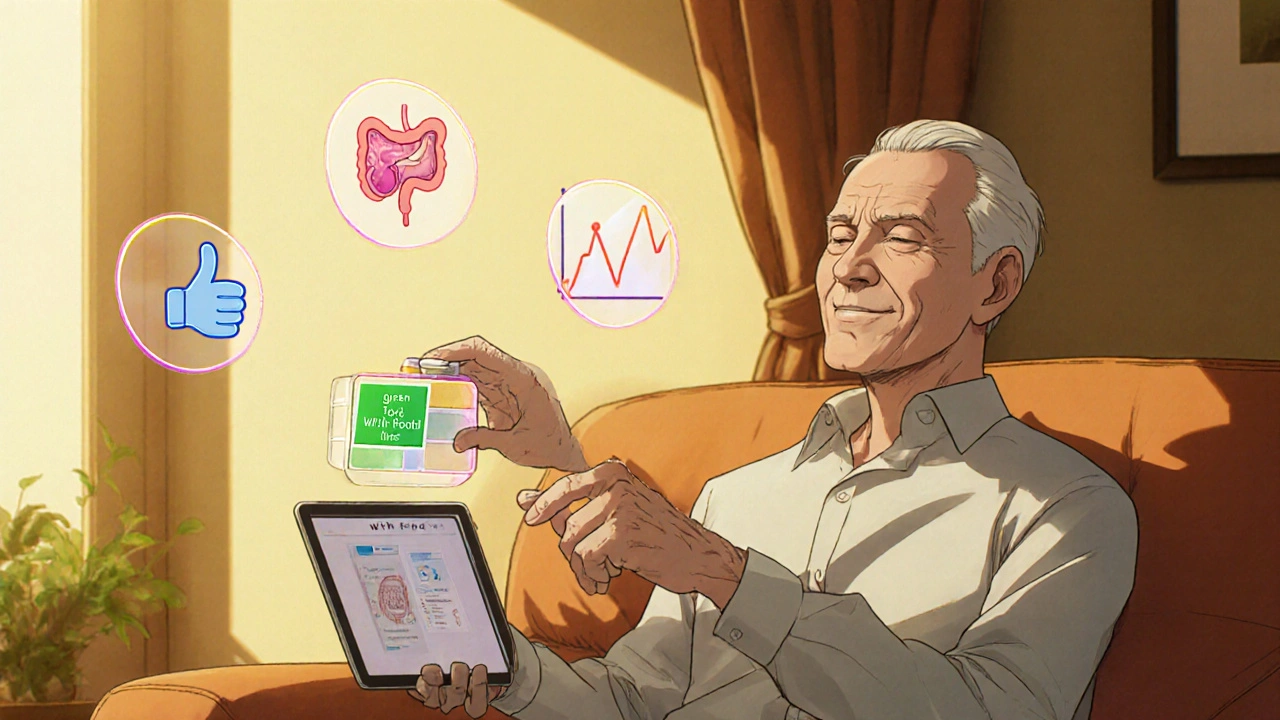
How to Get It Right
Here’s how to avoid the most common mistakes:
- Read the label. Look for “take with food,” “take on empty stomach,” or “avoid grapefruit.”
- Ask your pharmacist. They’re trained to spot interactions. Don’t assume your doctor told you everything.
- Use a pill organizer with time slots. Some apps like Medisafe send reminders not just to take your pill, but whether to take it before or after eating.
- Keep a food and med log. Note what you ate and when you took your meds. If you feel off, you’ll know what to look at.
- Be consistent. If you take your statin with dinner, always take it with dinner. Swapping meals throws off your levels.
Many pharmacies now use color-coded stickers on bottles: green for “take with food,” red for “take alone,” yellow for “flexible.” Ask if yours does.
The Bigger Picture
This isn’t just about feeling better. Improper food-drug timing causes 68% of medication-related hospitalizations in the U.S. That’s $177 billion a year in avoidable costs. The FDA now requires food interaction warnings on 92% of new prescriptions-up from 67% in 2018. That’s because they know how often people get it wrong.
New tech is helping. Smart pills that track when you take them and whether you’ve eaten are now FDA-approved. AI apps can warn you if your breakfast conflicts with your meds. But none of that matters if you don’t know the basics.
Medication isn’t just about what’s in the pill. It’s about when, how, and with what you take it. Food isn’t the enemy. It’s a tool. Use it right, and you’ll get the full benefit of your medicine-with fewer side effects, fewer trips to the ER, and more control over your health.
Can I take my medication with just a sip of milk?
No. A sip of milk isn’t enough to protect your stomach or help absorption. For most medications that say "take with food," you need at least 250-500 calories-a small meal, not a snack. Milk can also block antibiotics like tetracycline and ciprofloxacin, so even if it’s "with food," dairy might still interfere.
What if I forget to take my pill with food?
If you realize within an hour, eat a small meal and take it then. If it’s been longer, check the specific drug’s guidelines. For most, it’s safer to skip the dose than to take it incorrectly. But never double up. For drugs like levothyroxine or warfarin, even one missed timing can affect your levels for days.
Does it matter if I eat before or after taking my pill?
Yes. For drugs that need an empty stomach, take them at least 1 hour before eating. For those that need food, take them during or right after a meal. Timing affects how quickly the drug enters your system. Taking a statin before a fatty meal might not help-it needs the fat present during absorption.
Are there foods that are always safe to take with medication?
Plain water is always safe. Most fruits and vegetables (except grapefruit and high-vitamin K greens if you’re on warfarin) are low-risk. But don’t assume. Even apples or bananas can affect how fast some drugs move through your gut. Always check the label or ask your pharmacist.
Why don’t doctors always tell me about food interactions?
Doctors are often pressed for time. In one study, only 22% of patients over 65 received clear food-drug instructions during their prescription visit. Pharmacists are better trained for this. Always ask your pharmacist when you pick up a new prescription. They have access to detailed interaction databases and can explain exactly what to avoid.
Write a comment
Items marked with * are required.
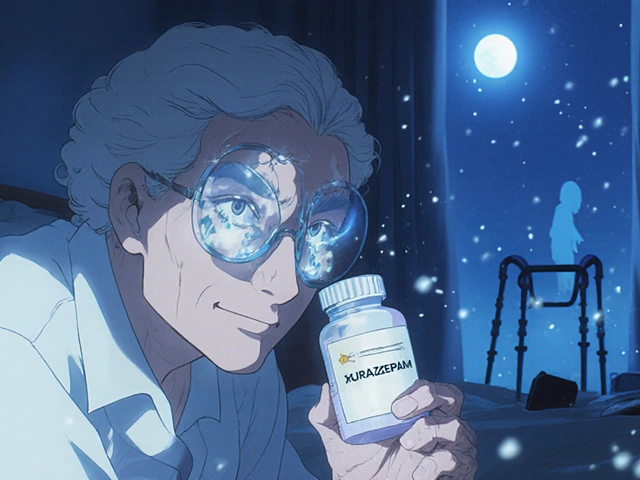
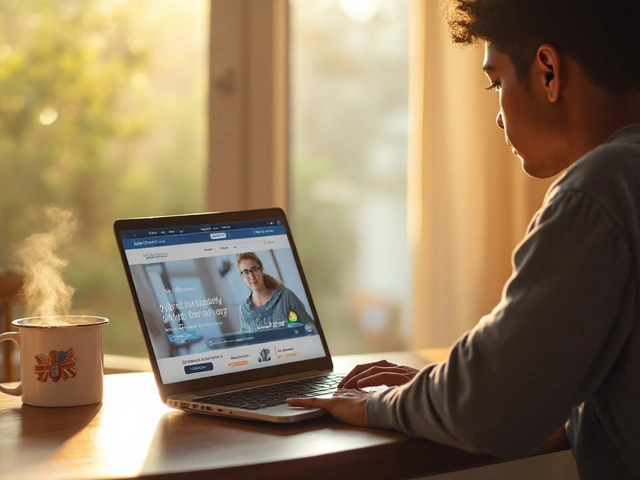
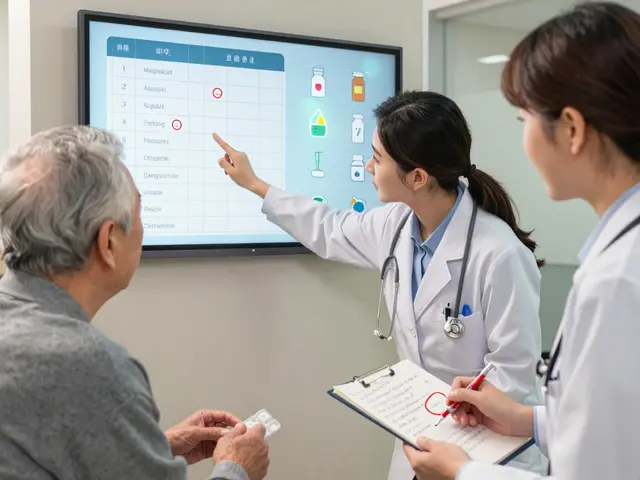

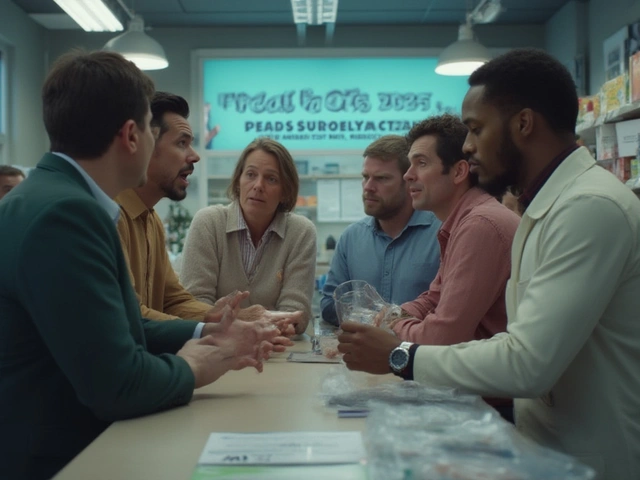

12 Comments
Herbert Lui October 30, 2025 AT 10:50
So many people treat meds like candy-pop it with coffee and call it good. But food isn’t just filler, it’s a co-pilot. I’ve seen friends on warfarin swing from clotting to bleeding because they ate kale one day and salad the next. It’s not magic, it’s biochemistry. And nobody tells you this until you’re in the ER.
Food changes everything. Even the timing. I take my statin with dinner now, not breakfast. My LDL dropped 20% in three months. No new pill. Just better timing.
It’s wild how little we’re taught about this. We learn how to use a microwave but not how to use our own bodies.
Nick Zararis October 31, 2025 AT 11:49
READ. THE. LABEL. Seriously. I used to take my levothyroxine with my morning coffee and banana. I was tired ALL the time. My doctor said, ‘You’re not compliant.’ I said, ‘But I take it every day!’ Turns out, I was taking it WRONG. I switched to taking it on an empty stomach, 30 minutes before anything else. My energy came back. My mood stabilized. My thyroid levels normalized. It’s not complicated. It’s just ignored.
Pharmacists are your secret weapon. Ask them. Don’t just assume your doctor told you everything. They’re rushed. You’re the one who has to live with the consequences.
Sara Mörtsell October 31, 2025 AT 12:37
Let’s be real nobody cares about your meds unless they’re on them. I took metformin for six months without food because I was trying to ‘fast for health.’ Ended up in the bathroom every morning like a horror movie. My doctor laughed. Said I was ‘a walking clinical trial.’
Food isn’t the enemy. Ignorance is. And the system? It’s designed to keep you confused. Big Pharma doesn’t want you to know that grapefruit juice can turn your statin into a chemical grenade. They want you to keep buying pills. And blaming yourself when you feel awful.
Stop trusting your doctor. Start trusting your gut. And your pharmacist. And your Google search. Because no one else is going to do it for you.
Rhonda Gentz November 1, 2025 AT 07:52
I never realized how much my body was fighting me until I started tracking my meds and meals. I kept feeling off after taking my antidepressant. Turned out I was taking it with a protein shake. Turns out, protein slows absorption. So I switched to taking it with a small apple and water. Within a week, the fog lifted.
It’s not about being perfect. It’s about being aware. I keep a little notebook. One line: med + food + how I felt. It’s not glamorous. But it’s mine. And it works.
Medication isn’t a magic bullet. It’s a tool. And tools need context. Just like a hammer needs a nail, your pill needs the right environment to do its job.
Alexa Ara November 2, 2025 AT 21:23
You’re not alone if this feels overwhelming. I was terrified of my new meds until I started using Medisafe. It reminds me when to take them and whether to eat first. I even got a color-coded pill box-green for with food, red for empty stomach. It’s tiny, but it changed everything.
And yes, a sip of milk doesn’t count. I used to think that was enough. Now I know: a banana and a handful of nuts is the bare minimum. It’s not about being fancy. It’s about being safe.
You’ve got this. Small changes. Big results. And you don’t have to do it alone. Ask your pharmacist. They love helping. Seriously.
Olan Kinsella November 4, 2025 AT 01:14
They don’t want you to know this but food and meds are a trap. The system wants you dependent. They make you think you need pills. But what if your body just needed better food? What if the real problem was processed junk? What if grapefruit isn’t the villain… but the messenger?
I stopped all my meds. Went vegan. Fasted. No more dizziness. No more nausea. My doctor called me ‘unconventional.’ I called it freedom.
They don’t teach you this in med school because it doesn’t sell. But I’ve seen people heal without pills. Just by eating right. You think your statin is saving you? Or just masking the real issue?
Wake up. Food isn’t just timing. It’s the cure.
Kat Sal November 4, 2025 AT 18:33
I used to think ‘take with food’ meant ‘whenever you feel like it.’ Then I got sick for a week after my antibiotics. My pharmacist said, ‘You took it with a bag of chips?’ I said, ‘Yeah?’ She looked at me like I’d just admitted to eating a live octopus.
Now I plan my meds like I plan my workouts. Consistency. Routine. No exceptions. Even on weekends. Even when I’m lazy.
And if you’re over 65? Please. Ask your pharmacist. They’re not just the guy behind the counter. They’re your health ally. I text mine every time I get a new script. It’s the best $0 I’ve ever spent.
Rebecca Breslin November 4, 2025 AT 23:56
Everyone’s talking about grapefruit like it’s some dangerous alien fruit. But let’s be honest-most people don’t even know what enzyme inhibition means. It’s not magic. It’s CYP3A4. And yes, it’s in grapefruit. And yes, it can kill you. But here’s the thing: the FDA requires warnings on 92% of new prescriptions. That’s progress.
And levothyroxine? If you take it with calcium, you’re wasting your money. Period. I’ve seen 30% absorption drops in studies. That’s not a myth. That’s pharmacokinetics. If you’re still taking it with yogurt, you’re not being careful-you’re being reckless.
Kierstead January November 5, 2025 AT 16:40
Let’s cut the fluff. People are dumb. They take pills with soda, coffee, milk, or worse-nothing. Then they wonder why they feel like crap. It’s not the drug. It’s the user.
Warfarin and spinach? You think that’s complicated? It’s not. You eat greens, you get your INR checked. You don’t, you don’t. It’s that simple. If you can’t follow a two-sentence rule, maybe you shouldn’t be on meds at all.
And ‘take with food’ doesn’t mean ‘when you feel like it.’ It means ‘with a real meal.’ A cracker isn’t food. It’s a snack. And snacks don’t count. Stop making excuses. Your body isn’t a lab rat. It’s your life. Treat it like it matters.
Imogen Levermore November 7, 2025 AT 03:18
what if all this is a scam?? like… what if the whole food-med thing is just to sell more apps and pill boxes?? i mean… who even decides what ‘food’ means?? why not just take it with water??
my uncle took his blood pressure med with orange juice for 12 years and lived to 93. so… maybe it’s all hype??
also i think the FDA is controlled by big pharma and they just want us to buy more stuff. i read it on a forum. it was detailed. with graphs.
also i think grapefruit is fine. i eat it every day. my doctor never said anything. so… maybe she’s lying?? 😳
Chris Dockter November 9, 2025 AT 02:00
Food doesn't matter. Take your pills when you want. Stop overthinking it.
Nick Zararis November 9, 2025 AT 23:45
Chris, you’re not helping. I’ve seen people end up in the hospital because they thought ‘take with food’ meant ‘whenever I feel like it.’ Your attitude isn’t freedom-it’s negligence.
And no, your uncle living to 93 doesn’t disprove pharmacokinetics. That’s anecdotal nonsense. One data point doesn’t rewrite science.
People like you make it harder for the rest of us to get taken seriously when we actually need help.